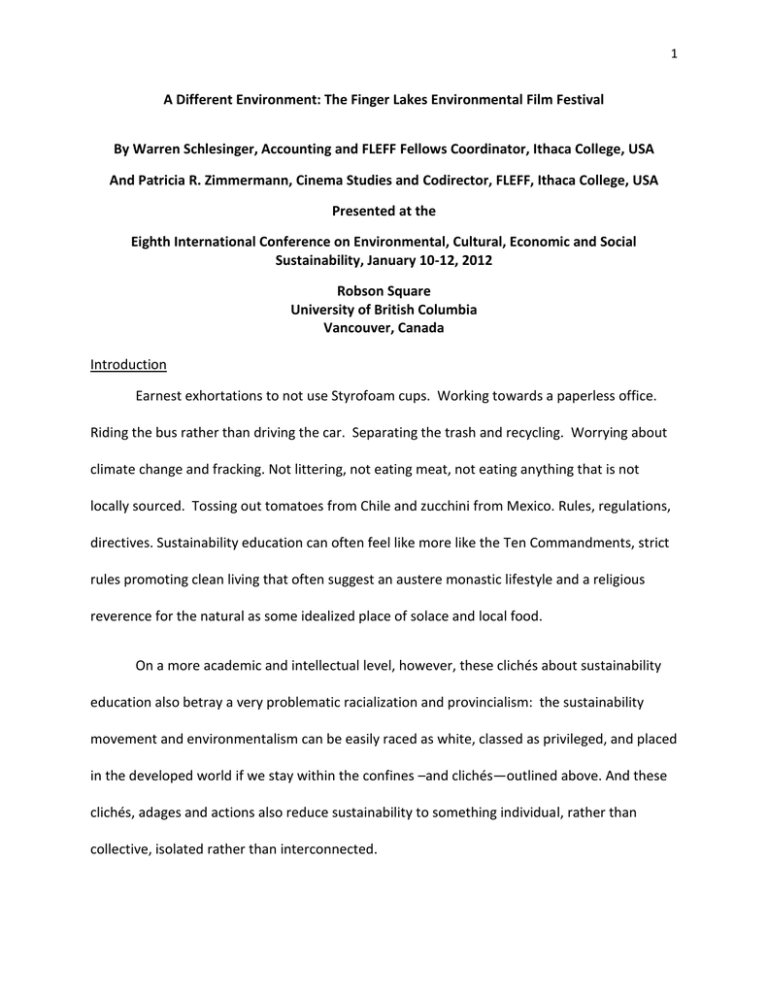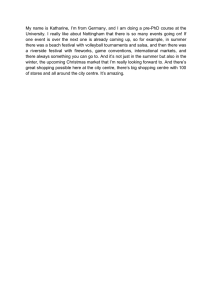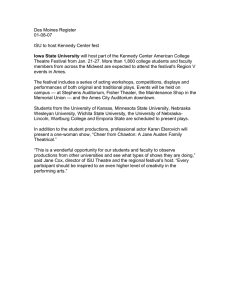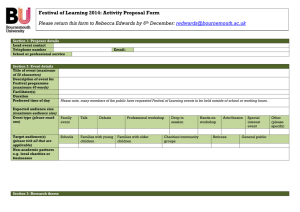Download A Different Environment, by Patricia R. Zimmermann/Warren Schlesinger
advertisement

1 A Different Environment: The Finger Lakes Environmental Film Festival By Warren Schlesinger, Accounting and FLEFF Fellows Coordinator, Ithaca College, USA And Patricia R. Zimmermann, Cinema Studies and Codirector, FLEFF, Ithaca College, USA Presented at the Eighth International Conference on Environmental, Cultural, Economic and Social Sustainability, January 10-12, 2012 Robson Square University of British Columbia Vancouver, Canada Introduction Earnest exhortations to not use Styrofoam cups. Working towards a paperless office. Riding the bus rather than driving the car. Separating the trash and recycling. Worrying about climate change and fracking. Not littering, not eating meat, not eating anything that is not locally sourced. Tossing out tomatoes from Chile and zucchini from Mexico. Rules, regulations, directives. Sustainability education can often feel like more like the Ten Commandments, strict rules promoting clean living that often suggest an austere monastic lifestyle and a religious reverence for the natural as some idealized place of solace and local food. On a more academic and intellectual level, however, these clichés about sustainability education also betray a very problematic racialization and provincialism: the sustainability movement and environmentalism can be easily raced as white, classed as privileged, and placed in the developed world if we stay within the confines –and clichés—outlined above. And these clichés, adages and actions also reduce sustainability to something individual, rather than collective, isolated rather than interconnected. 2 FLEFF: A different environment The Finger Lakes Environmental Film Festival (FLEFF), now in its 15th year, is a one week long multimedia extravaganza that asks its audience to think differently about the environment. The Finger Lakes Environmental Film Festival was launched in 1997 as an outreach project from the Center for the Environment at Cornell University. Always dedicated to films with a message, the festival, under program director Christopher Riley, expanded to become a major regional event in upstate New York. In 2004 Ithaca College was the major sponsor and host of the festival. In 2005 the festival moved permanently to Ithaca College, where it is housed in the Office of the Provost as a program to link intellectual inquiry and debate to larger global issues. Professor of cinema, photography, and media arts Patricia Zimmerman and professor of politics Thomas Shevory are the codirectors of the festival. When the festival moved to Ithaca College, FLEFF’s focus and direction shifted significantly to reflect the college’s commitment to sustainability, interdisciplinarity, and internationalism. It expanded from a film and video festival primary focused on shorter documentaries with a more traditional definition of the environment towards a more multidisciplinary, multimedia, trans-art event with a more international focus. It includes over 40 guests and over 120 events, including screenings, labs, parties, readings, concerts. FLEFF works and is programmed to unsettle preconceptions of the environment and nature, proposing instead that one needs to think across, between and around, finding interconnections between different modes, issues, and sectors rather than thinking of ideas or politics or problems in isolation. 3 A key operating value of FLEFF is collaboration across campus, in the community and internationally. Ithaca College has been involved in the festival since its inception, first as a sponsor and host, and then, in 2005, as major presenting sponsor. The Finger Lakes Environmental Film Festival at Ithaca College embraces and interrogates sustainability across all of its forms: economic, social, ecological, political, cultural, technological, and aesthetic. The festival is in the spirit of UNESCO’s initiative on sustainable development. This initiative has redefined and expanded environmental issues to explore the international interconnections between war, disease, health, genocide, the land, water, air, food, education, technology, cultural heritage, and diversity. Through film, video, new media, installation, performance, panels, and presentations, the festival engages interdisciplinary dialogue and vigorous debate. It links the local with the global. And it showcases Ithaca College as a regional and national center for thinking differently—in new ways, interfaces, and forms—about the environment and sustainability. The festival engages the UNESCO definition of sustainability, a more international and complexly interconnected conception that works to make clear the links between the environment, human rights, labor, capital, diversity, social issues, politics, and technology. This definition is not about adages of politically correct, individual behaviors but instead about thinking through the environment as a dynamic system that is always in flux, and, endlessly reconfiguring. The Finger Lakes Environmental Film Festival is a conceptualization of the environment not as a set of commandments for clean living as a privileged lone soul wandering about the developed world latte in hand, but, rather, as a series of interrogations, interruptions, interventions, innovations, and infusions. In this way, FLEFF not only critiques this reductionist 4 and pastoral fantasy view of the environment with a more global perspective working through ideas about environmental justice, but also critiques the idea that sustainability is individually hewn by insisting that sustainability starts with provocative conversations and debates. FLEFF functions as an exploration of interdisciplinarity and internationalism. Sustainability, then, in the view of FLEFF, is not a series of directives or commandments, but a way to create platforms for convenings across heterogeneity. Heterogeneity drives the programming and organizational structure of FLEFF: the purpose of a festival is not to produce and mobilize a party line, but to induce and provoke debate, discussion, unsettlings across difference. Some of the issues, for example, that FLEFF programming has broached in the last five years expand the idea of the environment. Topics include meth use, underground economies in the US, immigration, the economic collapse in 2008, local economies, animal rights, race and water in Detroit, digital projects making robots that are genetically modified, artists working in racialized virtual worlds, terrorism, polar bears, toxic waste dumping in Africa, genocide in Cambodia, ethnic violence, agriculture in Colombia. FLEFF is more than a film festival, for example. It programs across a range of arts and intellectual spheres, including film, video, new media, online digital art, concerts, performances, readings, rock shows, discussions, labs. Filmmakers, writers, scholars, musicians and new media activists featured at FLEFF over the years have represented Mexico, Hong Kong, Colombia, Singapore, Mali, Brazil, Canada, Bolivia, China, France, Australia, England, Taiwan, Argentina, Poland, Indonesia, to provide a partial list. Its past programming themes have included memes, toxins, counterpoint, checkpoints, and water. FLEFF also works to bring 5 international media and art to Ithaca, so that our local community, a small town in deindustrialized upstate New York, can experience larger global conversations. FLEFF’s signature events have been silent film/live music/multimedia commissions, which have played to sold out audiences and which take advantage of the internationally renowned School of Music at Ithaca College and the well known music scene in upstate New York. Its 2012 programming theme is Microtopias. These themes are explored loosely, as pathways into a series of questions about a different environment. FLEFF’s tag line, a different environment, operates as a triple entendre. First, as a festival, it proposes to create a different to consider environmental issues-- complicating, expanding, internationalizing, connecting, problematizing, unsettling. Secondly, the festival creates a different environment in its own operation, foregrounding discussion and debate with visiting artists, filmmakers, new media artists, scholars, activists to sustain an environ of a public sphere to engage issues of substance that are unresolved. Thirdly, FLEFF hopes that convenings at the festival will produce a different environment, a future that endorses sustainability in all of its forms, from a global perspective. This different environment suggests an expansion of the definition of sustainability beyond individual actions towards a more collaborative modality, and beyond a romanticized pastoralism towards a more interconnected view of people, technology and place. FLEFF and Sustainability Education As a festival imbedded within an academic institution, FLEFF’s mission and business model is both different and similar to other arts/cinema/literary/music festivals. For Ithaca 6 College, FLEFF creates a public, international face of sustainability, positioning Ithaca College as a leader in posing questions, doing research, and thinking creatively about sustainability. FLEFF does not need to generate ticket sales to generate festival earned income, unlike other festivals that are stand alone operations. FLEFF also does not need to program big name musical acts or movie stars in order to increase attendance and visibility. FLEFF does not have a board of directors as it normative for other non profits, but instead has two advisory committees, one composed of faculty across a variety of disciplines and the second composed of national and international figures in writing, cinema, programming, environmental justice issues, and activism. FLEFF does not have an independent staff. The codirectors, the coordinator of internships, and the coordinator of mini courses and the fellows program are all faculty whose time has been reassigned. Staff in marketing, publicity, operations, development, technical facilities, etc work in those capacities at Ithaca College, with a portion of their time redirected to mount FLEFF. The programming choices of films, events, and guests are not exclusively determined based on what is new and cutting edge, but work in collaboration with Ithaca College faculty teaching and research agendas. As a strong indicator of commitment to sustaining dialogue and debate, all films, events, labs and workshops on campus are free and open to the public. Films are booked in coordination with faculty, who then open their classes to the community for FLEFF week. We have worked to program films that push and challenge our programming themes for the year, but also that connect with faculty interests. Frequently, faculty will suggest films or guests. This 7 model differs significantly from other programming models, as it is more ground up and community generated. Unlike stand alone nonprofit festivals, FLEFF can offer courses related to the festival. Although being located in a small town in upstate New York can be a liability when trying to book current art house releases, FLEFF’s connection with an institution of higher learning creates significant benefits: internships, mini-courses, and a fellowship program for emerging scholars of color. Two professional media producers who live in Ithaca (but who are not full time faculty) run our internship program, which is restricted to currently enrolled Ithaca College students. The internship is competitive. Over 50 students a year engage the festival and contribute to its operations. The mini courses draw on and develop the annual FLEFF programming theme. They span the disciplines and have attracted nearly 100 students each year, serving over 600 students since the festival moved to its Ithaca College home. The courses have spanned the Schools of Music, Humanities and Sciences, Communications, Business, Health Sciences, and many different disciplines such as English, Journalism, Health Policy, Business, and Music. The one credit mini courses engage students with the films, concerts and guests in a concentrated manner, with a faculty member facilitating specialized discussions. The mini courses also serve to stimulate college students to attend downtown festival screenings at the local non-profit art cinema. A significant program of FLEFF is its fellowship program for graduate students of color. When the college assumed major presenting sponsor status, the festival worked to meet Ithaca 8 College goals to increase diversity in hiring faculty. With support from the Office of Affirmative Action on campus, the fellows program offers transportation, food, housing and festival pass through a highly competitive, peer reviewed application process. To date, over 70 fellows have participated from a range of US universities with PHD programs. The fellows program is coordinated by Warren Schlesinger, Associate Professor in the School of Business, to create a cohort group for discussions around the films and events. The fellows program enhances the diverse voices participating in the Festival, has increased the visibility of Ithaca College as a place for emerging PHDs to apply for faculty positions, and has resulted in a special issue of a journal analyzing environmental films coedited by former FLEFF fellows. Partnerships: Making a Difference in the Local/Global Environment FLEFF’s engagement with actualizing a different environment models sustainable economic development. As the emerging academic and public policy literature on creative economies has shown, festivals and the arts can function as engines for economic redevelopment of brown zones (zones left empty or abandoned by deindustrialization). Rather than disconnected from communities as esoteric, inaccessible activities, festivals and the arts, within this line of thinking, can serve to create public spaces for convenings, draw people from heterogeneous backgrounds together, restore a sense of public sphere, and drive consumer spending in downtowns with restaurants, shopping and services. Partnerships that share resources, then can provide a platform for community convenings and also leverage audiences, skills, and outreach to motor economic sustainability on the local level. 9 Upstate New York has experienced deindustrialization for at least two decades, preceding the 2008 economic crash. Although in a college town and somewhat insulated from market volatility, Ithaca’s downtown faces continual challenges for economic revitalization. Some storefronts are empty; some small businesses are barely thriving. However, restaurants are emerging and attracting business. The State Theater, a historic landmark, has revitalized itself with programming across different market sectors. The various festivals in Ithaca (almost one a month) and a vital art scene in painting, photography, and theater have served as both social and economic stimuli to revive the downtown area. Within this larger context of creative industries, where the arts are viewed as integrated within the local economy, FLEFF has worked to create both local and international partnerships. Partnerships take a weakness—remote location, limited resources, smaller audience than larger festivals in urban areas—and transform them into strengths. Internationally, FLEFF’s partnerships have produced several advantages: collaborations to secure difficult to find films from Africa, Latin America and Asia; international visibility; exchanges of films between other festivals and organizations; contests and projects that operate on a transnational model of sharing resources. FLEFF has formed significant international partnerships with the Voices from the Waters Film Festival in Bangalore India, with Engage Media in Indonesia, and with a consortium of festivals in Spain and Africa, for example. The most significant partnership, however, has been FLEFF’s collaboration with Cinemapolis, the local nonprofit independent art house. With state and city economic assistance, the theater built a new five screen multiplex in the downtown. Like most art 10 houses, Cinemapolis audiences have not only “grayed” but have gotten smaller. The days of cinephilia—where specialized audiences would flock to specialty art houses for the latest international fare—are over. Less than 1% of all art house releases are foreign language films, a significant drop over the last 20 years. Cinemapolis—and art houses across the country—have challenges attracting new and younger audiences. Ithaca College and FLEFF also operate with some significant liabilities in the larger entertainment business landscape. The college does not have 35mm theatrical projection, nor does it have access to a theatrical booker who has relationships with boutique film distributors. The college also does not have professional projectionists. With spaces booked to capacity with wall to wall events, the college has very few spaces where a large film screening can take places. The college also has a mission to integrate itself more in the larger Ithaca community, opening up its academic, intellectual and intellectual endeavors to those beyond the college. In the context of FLEFF’s liabilities for access to the commercial film distribution industries and Cinemapolis need to expand audiences and programming, a partnership was created that has proved enduring and fruitful to both parties. FLEFF, as part of a larger institutions, brings research skills, marketing, publicity, interns, and access to academics to lead post screening discussions, while Cinemapolis brings experienced feature film programmers, a boutique film booker in New York City, an active board composed of community members, connections to the downtown business community, and five screens. The festival is now held for four days on the Ithaca College campus, and four days downtown at Cinemapolis. This vital partnership has amplified visibility for both organizations, expanded audiences, spurred 11 increased engagement, brought college students into the theaters, and opened up discussions at all festival screenings for community interaction. This partnership has produced benefits to both organizations that would have not been possible if each was working alone. Young people are in the theaters during the festival. Many shows sell out. Every film has a post screening discussion. Foreign language titles are screened during the festival, as well some crossover commercial titles. International art films can be booked. Distributors now want to collaborate with the festival. Students and community and festival guests mingle in the lobby discussing and debating films. Most importantly, the largest audiences and most prosperous week in terms of profit for Cinemapolis is FLEFF weekend. Lessons Learned In the seven years since FLEFF has been housed and operated within Ithaca College, the festival has gradually repositioned itself locally, nationally and internationally as offering not just a selection of cutting edge films, music, literature , and art, but as an environment for lively dialogue, debate, discussion, and community building—key engagements and outcomes for sustainability education. Rather than offering a static definition of “the environment”, “environmentalism,” “environmental justice,” “localism,” “ sustainability,” or “sustainability education,” that festival selections illustrate, FLEFF has instead worked to create fluid environments to interrogate definitions and investigate connections. FLEFF programming and operations are generated from a commitment to collaboration, heterogeneity of ideas and forms, and convenings that bring together diverse audiences who might not interact outside of the festival context. 12 The festival team, which includes faculty, students, staff and administrators from different areas of the college, has learned some important lessons about the nexus of festivals, higher education, sustainability education, and working between the local and the global. What we have learned is less a directive or a set of instructions, but rather more a set of questions for how sustainability education can explore new directions by disposing of doctrinaire attitudes and definitions and embracing a sense of exploration of concepts: 1. Heterogeneity is almost mandatory in programming, events, platforms, people. Heterogeneity fuels exchange of ideas and lively conversation. Heterogeneity embodies a more democratic mode, engendering unexpected connections and combustions. 2. Collaboration is probably the most important way of operating, and the only sustainable way to mount a festival with limited resources. Every faculty, staff, student, administrators, community member, local business, grants agency, consultant, organization has knowledge, connections, advice and ideas that can strengthen a festival. Sustainability means inviting many people into the conversation. 3. Partnerships are as important as securing grants and increased budgets. Partnerships that include local, national and international organizations and people leverage resources, expand knowledge and expertise, save money, and increase audiences. 4. Every event requires at least triple the amount of marketing, publicity and outreach you think it needs. Audiences do not just mysteriously appear because the music is great, the musicians are virtuosos, the film is significant, or the new media art marks off new 13 territory. Audiences must be built body by body, through contact. Despite what many may assume, a festival is not about programming and curating. That’s only 50%. The most important activity of a festival is public education about the program, the ideas, and their significance. Or, put differently, the most important part of a festival is sustaining an ongoing community dialogue that invites everyone in and makes them feel part of the festival. This takes a lot of work from a lot of people. 5. Engaging students in ideas about sustainability and the environment—despite their visibility in popular culture—is not an easy task. Mini courses, internships, classroom engagement, festival attendance require an enormous amount of outreach to faculty and students. People need structures, but the structures must have ample room for individual interpretation and contribution (as in how faculty teaching mini courses interpret the themes, often in ways our staff has never considered!) 6. Although certain parts of a festival remain the same (programming “big” feature films and art films in current release, working with nonprofit distributors, inviting new media artist, putting on multimedia concerts and live music/silent film, programming digital art exhibitions), the very definition of a sustainable festival is one that mixes it up, changes, responds to what works and what didn’t. Critique and assessment with others is vital— in fact, it’s the lifeblood of a festival. 7. The most important comment we hear at FLEFF is this one: How is this festival an environmental film festival? If you audiences are asking questions about what you doing conceptually, then you’ve done your job. You’ve opened up a space to question 14 the conceptions and definitions of sustainability and the environment. You’ve fulfilled your tag line: FLEFF: A different environment. 8. Finally, always remember the most important word of any festival. It’s a word we often do not use much in academia, and it’s a word that is often denigrated as antiintellectual. It’s a word that will get you through all the hard parts of marketing tough films and difficult new media art and experimental music. It’s a word that will get you through budget cuts and less audience than you hoped for. It’s a word that should be the mantra of sustainability education, and of festivals, and of any event that hopes to bring people together who would not typically sit in the same room. What is that three letter word? FUN.



